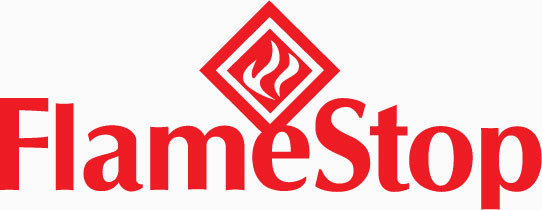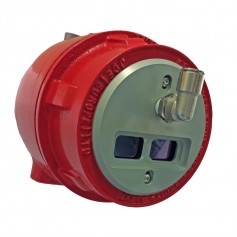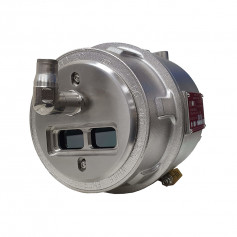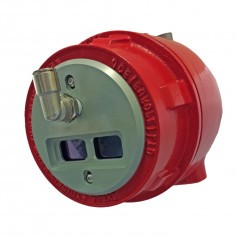Conveyor System Detection
- Portable Fire Equipment
- Portable Fire Extinguishers
- Mobile Fire Extinguishers
- Fire Extinguisher Vehicle Brackets
- Fire Extinguisher Cabinets & Covers
- Fire Extinguisher Servicing Tools & Consumables
- Fire Blankets
- Fire Hose Reels
- Fire Hydrant Landing Valves & Equipment
- Hoses, Nozzles & Adapters
- Lay Flat Hoses
- Hose Reel Tails
- Hose Nozzles
- Branch Pipes
- Storz Forged Aluminium Adapters
- Storz Cast Aluminium Adapters
- Storz Cast Aluminium Hydrant Couplings
- NSW/MFB Hydrant Couplings & Adapters
- CFA Hydrant Couplings
- QLD Hydrant Couplings
- BIC Hydrant Adapters & Couplings
- Washers
- Lay Flat Tools & Service
- Lay Flat Hose Cabinets
- Anti-Tamper Device
- Extinguisher Spare Parts
- Portable Extinguisher Parts
- Mobile Extinguisher Parts
- ABE 30 & 50kg Parts
- ABE 70 & 90kg Parts
- Purple K 30 & 50kg Parts
- Purple K 70 & 90kg Parts
- BE 30 & 50kg Parts
- BE 70 & 90kg Parts
- AFFF 30L & 50L Parts
- AFFF 70 & 90L Parts
- Alcohol Resistant 30L & 50L Parts
- Alcohol Resistant 70L & 90L Parts
- Fluorine Free 30 & 50L Parts
- Fluorine Free 70 & 90L Parts
- CO2 22kg Parts
- CO2 45kg Parts
- Wall Brackets
- Extinguisher Gauges
- Pull Pins
- Valve Stems & Valves
- Valve Seats & Washers
- Neck O' Rings
- Dip Tubes
- Springs
- Hoses
- Handles
- Portable Extinguisher CO2 Parts
- Nozzles, Valves & Adapters
- Rivets
- Mobile Extinguisher CO2 Parts
- Recharge Equipment
- Sirens
- Knapsacks
- Anti-Tamper Device
- AS1851 Testing Equipment
- Solo 365 Test Kit & Accessories
- Solo Kits
- Testifire Kits
- Smoke & Heat Heads
- TruTest Smoke Detector Sensitivity Kits
- Smoke Cans & Capsules
- Smoke Bombs & Smoke Pens
- Poles
- Battery Charger & Batons
- Removal Tools
- Accessories
- Universal Flame Detector Testers
- Scorpion Remote Detector Testers
- Digital Multimeters
- Speaker Testing Equipment
- Battery Function Testers
- Cyclone Canless Air Systems
- Digital Light Meters
- Ultrasonic Liquid Level Test Kits
- Extinguisher Service Tools
- Measuring Scales
- Fire Detection Systems
- Addressable Fire Alarm Systems
- Vigilant MX1 Addressable Panels
- MX1 Addressable Fire Panels
- AS1668 Controls and Gas Controls for MX1
- Addressable Detection & 850EMTK Programmer
- Addressable Modules and Field Devices
- Graphic Monitoring Software - XLG Client Server
- Vigilant Empty Cabinets & Battery Boxes
- IP Interface Networking
- MX Hazardous Detectors / Devices
- Documentation and Manuals
- FlameStop Addressable Fire Alarm Systems
- EST3X Addressable Fire Alarm Systems
- Vigilant MX4428 & F4000 Addressable Systems
- Simplex 4100ESi Fire Panels
- Vigilant MX1 Addressable Panels
- Emergency Warning Systems
- QE20 EWCIE and QE90 EWIS
- Occupant Warning Systems
- Evacuation Speakers
- AS ISO 7240.24 Flush Mount Speakers
- AS ISO 7240.24 Low Profile Flush Mount Speakers
- AS ISO 7240.24 Surface Mount Speakers
- AS ISO 7240.24 Horn Speakers
- AS ISO 7240.24 Sound Projectors
- Horn Speakers
- Ceiling Ball Speakers
- Pendant Ball Speakers
- Speaker Accessories & Cages
- Vandal Resistant Speakers
- Speaker Grills
- Megaphone
- Speaker Testing Equipment
- Visual Alarm Devices
- WIP Phones & WIP Cabinets
- Manual Call Points & Accessories
- VOX Speech Intelligibility Test Kits
- VESDA ASD Detectors
- Conventional Fire Alarm Systems
- Batteries
- Cable
- Smoke, Heat, Co Alarms & Accessories
- AS1851 Testing Equipment
- Ancillaries
- Power Supplies
- Miscellaneous Tools & Items
- Gas Panel Accessories
- Flame Detection
- Baseline Data & Termination Cabinets
- Stat-X Aerosol Fire Suppression
- OSID Emitters & Imagers
- Conveyor System Detection
- Anti-Tamper Device
- Addressable Fire Alarm Systems
- VESDA & FAAST FLEX ASD
- VESDA & FAAST FLEX Detectors
- VESDA Life Expectancy 2015
- Xtralis AS1851.2012 Maintenance
- VESDA LCD Programmer & High Level Interfaces
- VESDA-E Backward Compatibility Table – Firmware Versions
- Filters & Spare Parts
- VESDA Software
- Pipe and Fittings
- Automatic Air Purging System
- 19" Rackmount Configurations
- Gas Detection for VESDA
- VESDA Remote Displays
- Power Supplies
- VSM4 Configuration & Monitoring Software
- VESDA Documentation & Manuals
- VESDA Life Expectancy 2015
- Xtralis AS1851.2012 Maintenance
- VESDA-E Backward Compatibility Table – Firmware Versions
- VESDA Product Manuals & Data Sheets
- VESDA Technical Tips
- VESDA Maintenance & Troubleshooting
- VESDA Design & Commissioning
- VESDA Industry Documents
- VESDA Aspirated Smoke Detection for Impulse (Jet) Fans in Carparks
- VESDA Refrigerated Cold Storage Facilities - Design Guide & Information
- VESDA Case Studies
- VESDA Movies
- Smoke Bombs & Smoke Pens
- FAAST FLEX Documentation & Manuals
- Water & Mechanical
- Fire Sprinklers
- Valves
- Butterfly Valves cw Monitor Grooved
- Brass Butterfly Valves cw Monitor BSP
- Outside Screw and Yoke Gate Valve Grooved
- Outside Screw and Yoke Gate Valve Flanged
- Pump Connectors
- Swing Check Valves Grooved
- Alarm Valves - Grooved
- Waste and Test Valves
- Water Motor Alarm Gongs
- Retard Chambers
- Mini Ball Valves Gauge Cocks
- Lockable Ball Valves
- Brass Swing Check Valves
- Brass Spring Check Valves - Brass Spindle
- Brass Y Strainers
- Brass Gate Valves Threaded
- Pressure Relief Valves
- Sprinkler Control Valve Assembly’
- Wafer Check Valves
- Lugged Butterfly Valve c/w Lever Handle + Gear Operator
- Double Check Valves
- Globe Throttling Valves Grooved
- Pressure Reducing Valves
- Bermad FP450 60 Tank Infill Valves
- Float Valves
- Solenoid Valves
- Brass Fittings
- Roll Groove
- Rigid Angle Pad Couplings
- Flexible Couplings
- Fast Connect Couplings
- Reducing Couplings
- Transition Coupling
- Standard Radius 90 Degree Elbows
- Short Radius 90 Degree Elbows
- Standard Radius 45 Degree Elbows
- Standard Radius 22.5 Degree Elbows
- Standard Radius 11.25 Degree Elbows
- Standard Radius Tees
- Short Radius Tees
- Reducing Tees
- Concentric Reducers GxG
- Concentric Reducers GxT
- End Caps
- End Caps with Eccentric BSP
- Mechanical Tees Grooved
- Mechanical Tees BSP Thread
- Grooved x Flanged Adaptors
- Grooved Hinged x Flange Adaptors
- Bull Head Tees Grooved
- Hydrant Elbows Grooved
- Grooved x BSP Adaptors
- HYDRANT LANDING VALVES
- FIRE HOSE REELS
- HOSES, NOZZLES & ADAPTORS
- Flexible Droppers
- Steel Pipe
- Gal Mal
- 90 Degree Elbows
- Tees
- 90 Degree Elbows MF
- Hex Nipples
- Sockets
- Square Plugs
- Unions Brass Seat
- Reducing Bushes
- 90 Degree Reducing Elbows
- Reducing Tees
- Reducing Hex Nipples
- Reducing Sockets
- Bull Nose Tees
- Service Tees
- Sprinkler MF Adaptors
- Table D Flange x BSP Thread
- 45 Degree Elbows
- 45 Degree Elbows MF
- End Caps
- Crosses
- Hangers
- 1 Piece Channel Clips
- 2 Piece Channel Clips
- Pear Bands
- Pear Bands HDG
- Nut Clips M10
- Nut Clips M12
- Mounting Plates
- Angle Brackets
- Beam Clamps
- Shallow Saddles
- Deep Saddles
- Twist Clips
- Wrap Around Pipe Clamps
- Purlin Clips
- Threaded Rod ZP
- Threaded Rod HDG
- Rod Joiners ZP
- Rod Joiners HDG
- Rod Cutters
- Channel and Angle
- Cantilever Brackets
- Medium Duty Saddles UN15
- Medium Duty Double Bolted Clamps UN16
- Medium Duty Yoke Clamps UN18
- Pipe Stand Clamps cw 50Nb Half Socket
- U Bolts
- 2 Piece Stainless Steel 316 Stand Off Bracket
- Mechanical Fasteners
- Monitor Switches
- Gal Steel
- Stainless Steel
- Consumables
- Valve Gaskets
- Flange Full Face Gaskets Table E
- Ring Gaskets
- Fibre Full Face Gaskets Table E
- Angus
- Bermad
- Chisolm
- Globe
- Grinnell Wormald
- Mather and Platt
- Matthew Hall
- Padde
- Reliable
- Shurjoint
- Star Model F Quell Guardian
- Tyco Central F
- Tyco Gem
- Tyco DV5
- Victaulic
- Viking
- Walter and CIE
- Waste and Test Kits
- Dorot Diaphragm
- Cometal Diaphragm
- Dobbie Dico Dual Booster
- Hydrant Landing Valves
- Pressure Gauges
- Traffolyte Signs and Stickers
- Tools
- Hydrant
- Hydrant Landing Valve Roll Groove
- Hydrant Landing Valve BSP
- Dual Hydrant Booster Roll Groove
- Dual Hydrant Booster BSP
- Single Point Booster Roll Groove
- Hydrant Booster Cabinets
- Booster H Patterns
- Dual Hydrant Risers
- Tank Suction Adaptor
- Dual Hydrant Booster Roll Groove High Pressure
- Quad Hydrant Booster Roll Groove
- Quad Hydrant Booster Roll Groove High Pressure
- Jacking Pumps and Accessories
- PPE
- Passive Fire
- Anti-Tamper Device
- Exit & Emergency Lighting
- Suppression Systems
- Fire Fighting Foam
- Passive Fire Equipment
- HYDRANT LANDING VALVES
- Cabinets
- Hardware & Fasteners
- Signage & Stickers
- Custom Engraved Sign
- Custom Printed Sign
- Custom Vinyl Cut Sign
- Signs and Labels
- Extinguisher Location Signs
- Fire Blanket Location Signs
- Extinguisher Charts/Cards
- Identification Signs
- Hose Reel Location Signs
- Fire Exit Signs
- Fire Door Signs
- Misc Signs
- First Aid Signs
- WIP Signs
- Offences Signs
- Alarm Signs
- Hydrant Signs
- Sprinkler Signs
- Fire Signs
- Pressure Test Stickers
- Extinguisher Pictographs
- Extinguisher Labels
- Water & Mechanical
- Pipe Markers
- Engraved Signs
- Hydrant Signs
- Hose Reel Signs
- Fire Hose Reel & Fire Signs
- Hydrant Pump & Valve Signs
- Sprinkler System Signs
- Fire Alarm Panel Signs
- Gas System Signs
- EWIS Panel Signs
- Electrical Signs
- Hazardous Signs
- Custom Block Plans
- Customised Signs
- Fire Safety Door Signs
- Cabinet Signs
- Commonly Used Signs
- CO Fire Detectors Installed Engraved Signs
- Signs for VADs and VWDs
- Vinyl Cut Lettering
- Block Plans & Evac Plans
- Snap Frames
- Cabinet Stickers
Latest News
 Protecting Cold Storage Facilities using VESDA ASD – FlameStop TV Episode 50
Protecting Cold Storage Facilities using VESDA ASD – FlameStop TV Episode 50
 FlameStop Wins Johnson Controls 2024 APAC Open Globe Award for Outstanding Sales Excellence
FlameStop Wins Johnson Controls 2024 APAC Open Globe Award for Outstanding Sales Excellence
 New Quick-Connect Metal Grille Flush Mount Speaker - FlameStop TV Episode 49
New Quick-Connect Metal Grille Flush Mount Speaker - FlameStop TV Episode 49
 Universal Flame Simulator Test Kit - FlameStop TV Episode 48
Universal Flame Simulator Test Kit - FlameStop TV Episode 48
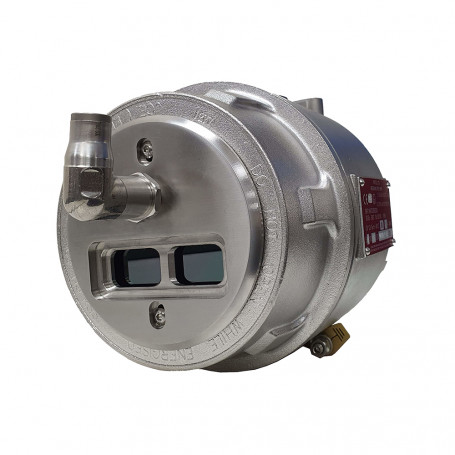 View larger
View larger Infra-Red Transit FLAME Sensor in Stainless Steel 316 Housing
PEW-IRHTFD-HT-SS
- Detection of ember and flame of high Temperature product
- Air purged system for dusty environments with air pressure monitoring
- Isolated Detectors for Maximum reliability
- Single / Coincidence voting output
- Timed auto reset / coincidence analyser circuit
- Tuned response — solar blind
- Voting Logic & Latching options
- Alarm & Trip Functions
- Fault Monitored, with Test & Reset push Buttons
- Field Programmable
- Volt free relay contact output operation selectable as standard
- Two wire operation - Can be powered by direct connection to standard fire trigger circuits
- Comes complete with mounting bracket
Click to download brochure!
This product is no longer in stock
Availability date:
- Detection of ember and flame of high Temperature product
- Air purged system for dusty environments with air pressure monitoring
- Isolated Detectors for Maximum reliability
- Single / Coincidence voting output
- Timed auto reset / coincidence analyser circuit
- Tuned response — solar blind
- Voting Logic & Latching options
- Alarm & Trip Functions
- Fault Monitored, with Test & Reset push Buttons
- Field Programmable
- Volt free relay contact output operation selectable as standard
- Two wire operation - Can be powered by direct connection to standard fire trigger circuits
- Comes complete with mounting bracket
Click to download brochure!
Technical Details
- Auxiliary Input : PSU / Charger etc.
- Current : Relay mode: 11mA Quiescent, 26mA Max / Full Alarm Low power mode: 1.8mA Normal Mode, less than 350 μA Fault, 5mA Fire and Alarm Load
- Detectors : 2 off isolating sensors
- IP Rating : IP66
- Material : Stainless Steel 316
- Outputs : Alarm/trip contact: 2 Pole C/O Fault contact: 1 Pole C/O Rating: 30V DC - 500mA
- Purge Air : Input Fitting: 10mm Compressed Air Hose Adaptor Pressure: 2.5 psi to 10 psi Minimum Delivery: 30 litres/min
- Sensitivity : 4 levels
- Spectral Filter : 4.2 - 4.7 μm (narrow band)
- Temperature : 20°C to +60°C
- Transit Speed : 0.5 to 6 m/s
- Voltage : 20-30V DC
- Weight : 3kg (sensor head)
Product Information
Infra-red transit flame sensors are designed to trigger an alarm if the material they are monitoring exceeds a temperature of 240°C. Sensitivities can also be set above this threshold. The sensor triggers as the material reaches the ember or flame condition. Material being transported can be monitored on conveyor systems running at speeds of between 0.5 and 6m/s.
The sensors employ enhanced infra-red monitoring technology to analyse the level of IR emissions in the narrow band of 4.2-4.7μm. As the sensor is tuned to this band it is ‘solar blind’ meaning the ‘background’ and ‘transient’ IR spectra are discriminated. This provides enhanced false alarm immunity.
Infra-Red Transit Flame Sensor for hazardous areas. IECEx/ATEX approved for Zones 1, 2 & 21, 22
This High Temperature Transit Flame Sensor monitors high temperature materials (up to 240° on highest sensitivity), being transported on conveyor systems at speeds of between 0.5 and 6m/s, and triggers as the material reaches the ember or flame condition.
The sensor employs enhanced infra-red monitoring technology that analysis the levels of IR emission in the narrow band of 4.2-4.7μm. As the sensor is tuned to this band it is “solar blind” meaning the “background” and “transient” IR spectra are discriminated. This provides enhanced false alarm immunity.
This unit is specifically designed for hazardous areas and is IECEx / ATEX approved for Zones 1, 2 & 21, 22.
Air purging from a compressed air feed is used to maintain a lens cleaning system that ensures the prevention of dust settling on the sensor window.
This unit incorporates within the unit a user programmable SIL switch. Option selection includes detector sensitivity settings, auto/manual reset sequence selection and single/coincidence voting from the two individual internal detectors for the alarm trip shutdown outputs.
The sensor air pressure and signal cable connections are fault monitored and fail safe. The controller incorporates an auxiliary fault input and common fault output contact.
Standard / Low Power Mode
The unit can be used in two principle operating modes. Either relay mode, with its own 24 Vdc power supply or in low power mode (as shown below), see datasheet for further details. The sensor is located above or beside the materials transit path (conveyor, roadway, etc.) by means of the adjustable mounting bracket and aligned such that the monitored hazard passes through the sensor’s field of view. The distance and angle of the sensor determine the width of the monitored path.
Sensitivity
The table below shows the width of the monitored product at the Lowest and Highest sensitivity settings. This is based on the sensor mounted 1m above Conveyor at 45° angle. Exact response is dependant on the emissivity factor of the monitored material, sensor orientation and target speed.
| Sensitivity Level | Monitoring Width |
| Lowest | 0.6m |
| Highest | 1.6m |
Air Purging
All infra-red transit heat and flame sensors feature air purging from a compressed air feed. This is used to maintain a positive air pressure across the sensor window to prevent dust settling. The air supply is monitored by a pressure switch which signals a fault status if the air supply fails.
Applications
- Food Processing
- Tobacco Processing
- Conveyors
- Waste Recycling Conveyors
- Baggage Handling
- Radio Frequency Drying Systems
- Microwave Drying Systems
- Waste Drying Systems
- Drying Conveyors
